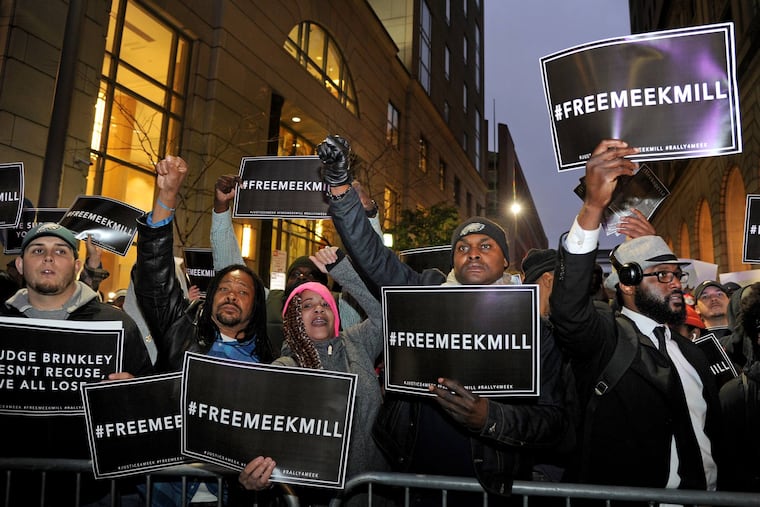Meek Mill’s champion activism signals an important shift | Opinion
Meek Mill's advocacy signals an important shift in political activism wherein a non-traditional advocate — namely a rapper who has done prison time — can have a meaningful seat at the table.

A champion of hip hop and now social justice, Meek Mill is receiving national recognition and applause beyond the Wells Fargo Center. His message of justice now overshadows his mug shot.
Since his 2018 release from a wrongful prison sentence, Meek has used his music and voice to call attention to “a broken criminal justice system.” And his activism is grabbing the attention of major outlets, such as the New York Times, where he shared his thoughts on prison reform in an op-ed. National platforms have handed the mic to Meek to comment on injustice and reform, with Meek speaking to the Guardian in a Jan. 10 article about his time in jail and his doubts about the charges he faced.
As a South Jersey native, I have no doubt that the boy from Berks Street in North Philadelphia is the right face for the movement. Witnessing the support he is receiving on a national level is both surprising and inspiring, and it signals an important shift in political activism wherein a nontraditional advocate — namely a rapper who has done prison time — can have a meaningful seat at the table.
Meek has received widespread support, including the #FreeMeekMill social media campaign, throughout his 2017 sentencing and release. Numerous public figures, including Gov. Tom Wolf, spoke out on his unjust, two-to-four-year sentence for minor probation violations.
Now uncuffed, he continues to shed light on injustices predominantly impacting people of color in the criminal justice system — a broken bail system, reliance on overburdened public defenders, and imbalanced sentencing. He has spoken on CNN, an experience he calls a dream, to offer a perspective rarely seen on a media format that favors pundits with traditional credentials. He has interviewed with Ellen DeGeneres and addressed students at Georgetown University.
Meek’s authenticity makes his activism stand out. No stranger to the system, Mill has spent the past 10 years on probation. The “Dreams and Nightmares” rapper is dedicated to freeing at least 1 million people from excessive probations and parole sentences. He is partnering with Philadelphia 76ers co-owner Michael Rubin to start a prison reform foundation to accomplish this goal. His recent album “Championships” speaks on the injustices and systematic issues within the criminal justice system. The album debuted number one on Billboard 200 and has been widely received as Meek’s rebound from injustice.
Music remains a priority for the rapper. Meek prefers not to be labeled an activist. He simply wants his music and efforts to speak for themselves, and they are. His verses on incarceration — about being “shackled from ankle to feet” on “What’s Free” — and social media support for Cyntoia Brown, a Tennessee woman recently granted clemency by the governor years after killing a man who had picked her up for sex and assaulted her, speak volumes for the ongoing injustices against marginalized communities.
His activism is not immune to criticism, with some questioning Meek’s credibility on policy issues, and his genuineness given his celebrity status. But his experiences spending over a decade on probation, in and out of courtrooms and jail cells, are legitimate qualifiers to weigh in on how the system damages lives.
With criminal justice reform seeing a moment — including Congress passing the bipartisan First Step Act last month — the policymakers leading the conversation should welcome and incorporate the views of people like Meek. When Meek speaks on national television, he is not only speaking for himself. He is speaking up for the incarcerated, he is speaking up for the black community, he is speaking up for Philadelphia. This sounds like justice to me.
Alexis Foster is a journalism student at American University and originally from South Jersey.